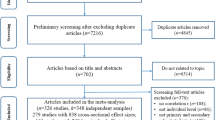Abstract
We estimate impacts of ability mixing compared to ability grouping in high school education on students’ adulthood earnings. To overcome endogeneity and selection problems that plagued the previous studies, we exploit a policy experiment in South Korea in the 1970s, which changed the education regime of general high schools from grouping to mixing in major cities. We find that the mixing treatment has a positive but statistically insignificant effect on average adulthood earnings. We also find that while mixing has positive effects on low ability students’ adulthood earnings, it has smaller positive or even negative effects on higher ability students.
Similar content being viewed by others
References
Alexander KL, McDill EL (1976) Selection and allocation within schools: some causes and consequences of curriculum placement. Am Sociol Rev 41(6):963–980
Amemiya T (1982) Two stage least absolute deviations estimators. Econometrica 50(3):689–712
Argys LM, Rees DI, Brewer DJ (1996) Detracking America’s schools: equity at zero cost? J Policy Anal Manag 15(4):623–645
Benabou R (1996) Heterogeneity, stratification, and growth: macroeconomic implications of community structure and school finance. Am Econ Rev 86(3):584–609
Bertrand ME, Duflo E, Mullainathan S (2004) How much should we trust differences-in-differences estimates? Q J Econ 119(1):249–275
Betts JR, Shkolnik JL (2000) The effects of ability grouping on student achievement and resource allocation in secondary schools. Econ Educ Rev 19(1):1–15
Blanchflower DG (2004) Self-employment: more may not be better. Swed Econ Policy Rev 11(2):15–74
Buchinsky M (1998) Recent advances in quantile regression models: a practical guideline for empirical research. J Hum Resour 33(1):88–126
Chiswick BR, Cohen Y, Zach T (1997) The labor market status of immigrants: effects of the unemployment rate at arrival and duration of residence. Ind Labor Relat Rev 50(2):289–303
Chung BG (1998) A study of the high school leveling policy in the Republic of Korea: its genesis, implementation, and reforms, 1974–1995. Ph.D. thesis, University of Hawaii
Corak M (2001) Death and divorce: the long-term consequences of parental loss on adolescents. J Labor Econ 19(3):682–715
Figlio DN, Page ME (2002) School choice and the distributional effects of ability tracking: does separation increase equality? J Urban Econ 51:497–514
Gamoran A (1987) The stratification of high school learning opportunities. Sociol Educ 60(3):135–155
Hanushek EA, Kain JF, Markman JM, Rivkin SG (2003) Does peer ability affect student achievement? J Appl Econ 18:527–544
Hanushek EA, Kain JF, Rivkin SG (2004) New evidence about Brown v. Board of Education: the complex effects of school racial composition on achievement (mimeographed) Stanford University
Henderson V, Mieszkowski P, Sauvageau Y (1978) Peer group effects and educational production functions. J Public Econ 10:97–106
Hoxby C (2000) Peer effects in the classroom: learning for gender and race variation. NBER Working Paper 7867
Kerckhoff AC (1986) Effects of ability grouping in British secondary schools. Am Sociol Rev 51(6):842–858
Koenker R, Bassett G (1978) Regression quantiles. Econometrica 46(1):33–50
Korea Labor Institute (1998) Reports on the Korean labor and income panel study I, II, III. Korea Labor Institute, Seoul
Lang K, Zagorsky JL (2001) Does growing up with a parent absent really hurt? J Hum Resour 36(2):253–273
Lazear EP (2001) Educational production. Q J Econ 116(3):777–803
Lee MJ (2005) Micro-econometrics of policy, program, and treatment effects. Advanced texts series. Oxford University Press, London, UK
McLanahan S, Sandefur G (1994) Growing up with a single parent: what hurts, what helps. Harvard University Press, Cambridge, MA
Oakes J (1985) Keeping track: how schools structure inequality. Yale University Press, New Haven, CT
Powell JL (1983) The asymptotic normality of two-stage least absolute deviations estimators. Econometrica 51(5):1569–1576
Rees DI, Brewer DJ, Argys LM (2000) How should we measure the effect of ability grouping on student performance? Econ Educ Rev 19(1):17–20
Rosenbaum JE (1980) Track misperceptions and frustrated college plans: an analysis of the effects of tracks and track perceptions in the national longitudinal survey. Sociol Educ 53(2):74–88
Summers AA, Wolfe BL (1977) Do schools make a difference? Am Econ Rev 67(4):639–652
Vanfossen BE, Jones JD, Spade JZ (1987) Curriculum tracking and status maintenance. Sociol Educ 60(2):104–122
Author information
Authors and Affiliations
Corresponding author
Additional information
Responsible editor: Junsen Zhang
Rights and permissions
About this article
Cite this article
Kang, C., Park, C. & Lee, MJ. Effects of ability mixing in high school on adulthood earnings: quasiexperimental evidence from South Korea. J Popul Econ 20, 269–297 (2007). https://doi.org/10.1007/s00148-006-0090-y
Received:
Accepted:
Published:
Issue Date:
DOI: https://doi.org/10.1007/s00148-006-0090-y




